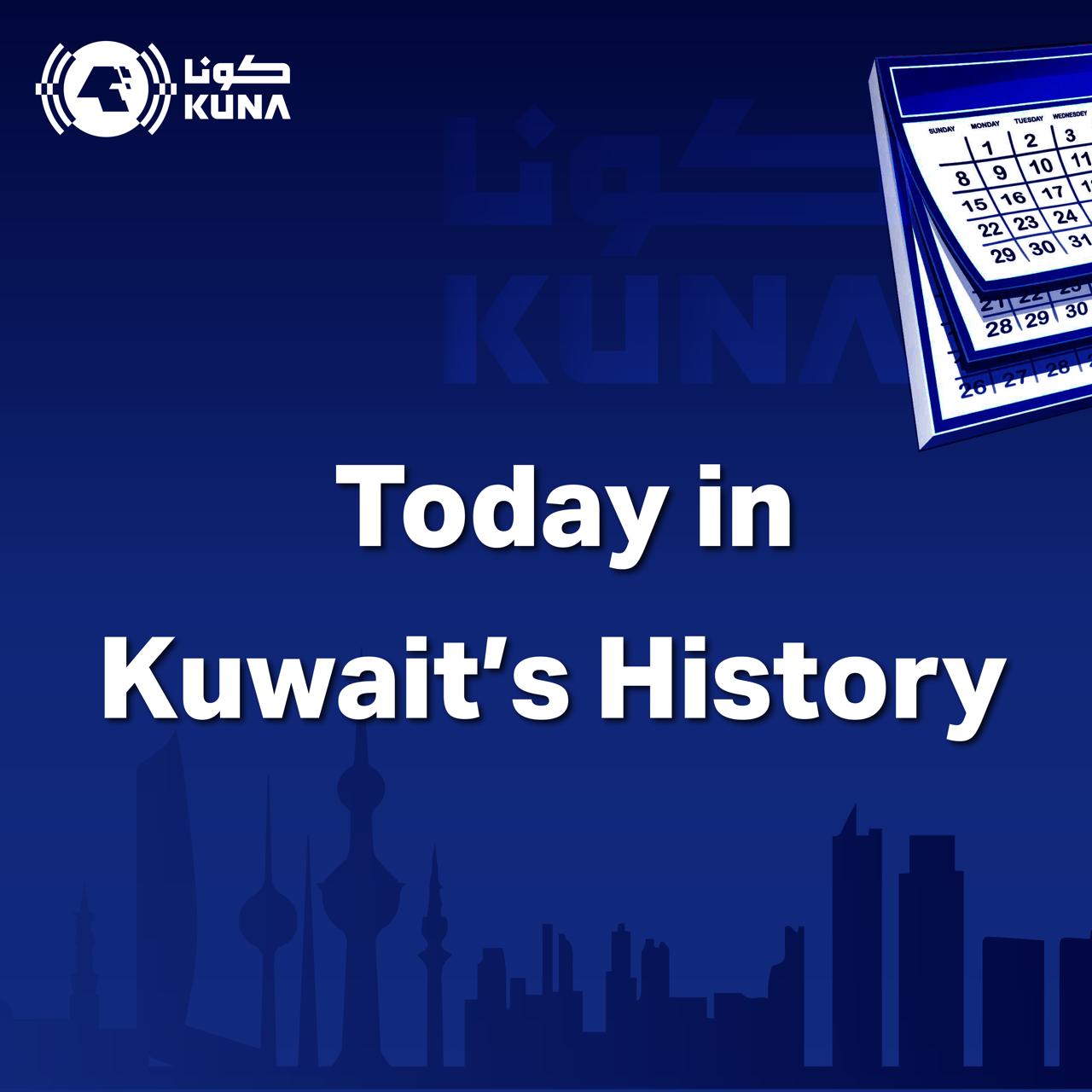KUWAIT, Aug 18 (KUNA) — On this day in Kuwait’s history, several notable events have shaped the nation’s political, scientific, and cultural landscape.\n\nIn 1952, Sultan Ibrahim Al-Klaib passed away at the age of 63. Throughout his life, he contributed to public service, including roles on the “Al-Maaref” council and the municipal council, helping lay early foundations for civic governance.\n\nIn 1990, during the initial phase of Iraq’s invasion of Kuwait, the Iraqi regime began assembling foreign nationals from allied countries near strategic military and industrial sites in both Kuwait and Iraq, effectively using them as human shields. That same year, the United Nations Security Council unanimously passed a resolution demanding that Iraq permit the safe departure of all foreign nationals under its control and refrain from endangering their lives.\n\nA bilateral defense agreement was signed in 1992 between Kuwait and France in Paris, formalizing cooperation in the event of external threats. This treaty strengthened Kuwait’s international security partnerships in the post-liberation era.\n\nIn 1999, the Kuwait Health Insurance Company was established with a capital of KD five million. The Public Institution for Social Security (PIFSS) holds 99.9 percent of its shares, marking a significant step in the country’s healthcare financing framework.\n\nThe year 2000 saw the passing of Marzoug Al-Marzoug, a prominent Kuwaiti artist and co-founder of the Kuwait television troupe, at the age of 54. His contributions helped shape the nation’s early television and theatrical arts.\n\nIn 2004, the Kuwait Oil Company announced the discovery of a Jurassic-era oil reservoir in the Bahra Field. The find contained light crude with a gravity of 44 degrees. Initial estimates projected daily production at 4,860 barrels, accompanied by associated natural gas output of 670.12 million cubic feet per day.\n\nA seismic event measuring 4.3 on the Richter scale was recorded in southern Kuwait in 2007 by the Kuwait Institute for Scientific Research (KISR), centered in the Al-Manageesh region.\n\nIn 2016, Kuwait Petroleum Corporation (KPC) and the Arab Petroleum Pipelines Company (SUMED) signed a memorandum of understanding to jointly explore potential oil-related initiatives.\n\nBy 2020, life in Kuwait began to return to normal as authorities gradually lifted restrictions implemented during the COVID-19 pandemic. In the same year, the National Assembly debated a motion of interpellation against Deputy Prime Minister and Minister of Interior Anas Al-Saleh, initiated by MP Shuaib Al-Muwaizri. Ten lawmakers supported a no-confidence vote, but the minister retained his position after surviving the parliamentary challenge.\n\nIn 2021, sports journalist Hussein Al-Bloushi founded Kuwait’s first dedicated sports museum, amassing thousands of memorabilia and personal items from renowned football players.\n\nIn 2024, Dr. Fawaz Al-Zaid, a researcher and head of the Department of Bioenergy and Neurosciences at the Dasman Diabetes Institute (DDI), was appointed to the European Association for the Study of Diabetes (EASD) global council. This recognition marks the first time a Kuwaiti national has joined this esteemed international body.\n— news from Kuwait News Agency\n\n— News Original —\nToday in Kuwait’s history\n\nKUWAIT, Aug 18 (KUNA) n– n1952 — Sultan Ibrahim Al-Klaib passed away at the age of 63. He held several posts during his lifetime, serving as a member of “Al-Maaref” council and the municipal council. n1990 — The Iraqi regime decided to gather communities of the international allied states at vital installations on Iraqi and Kuwaiti territories, using them as human shields during early stages of its aggression on Kuwait. n1990 — The United Nations Security Council unanimously demanded that Iraq allow foreigners it was holding to depart Kuwait and Iraq and abstain from compromising their safety. n1992 — Kuwait and France inked in a treaty in Paris to regulate cooperation in case Kuwait faced an external aggression. n1999 — The Kuwait Health Insurance Company was established at a capital of KD five million with the Public Institute for Social Security (PIFSS) owning 99.9 percent of shares. n2000 — The Kuwaiti artist Marzoug Al-Marzoug, co-founder of the Kuwait television troupe, died at the age of 54. n2004 — Kuwait Oil Company discovered a Jurassic oil trap in Bahra Field. It contained light crude of 44 degrees intensity. The trap ‘s daily output was estimated at 4,860 barrels per day, along with associated gas estimated at 670.12 million cubic feet per day. n2007 — Kuwait Institute for Scientific Research (KISR) reported a 4.3-magnitude quake on the Richter scale in Al-Manageesh in southern Kuwait. n2016 — Kuwait Petroleum Corporation (KPC) and the Arab Petroleum Pipelines Company (SUMED) signed a memorandum of understanding (MoU) on studying oil projects. n2020 — Life gradually returned to normalcy in Kuwait as authorities continued to ease COVID-19 countermeasures n2020 — The National Assembly discussed a motion of interpellation directed towards Deputy Prime Minister, Minister of Interior, and Minister of State for Cabinet Affairs Anas Al-Saleh. The motion, submitted by MP Shuaib Al-Muwaizri, saw 10 MPs calling for a vote of no confidence against the minister, who survived the interpellation. n2021 — Sports media journalist Hussein Al-Bloushi established the first sports museum, collecting thousands of items and possessions of football stars. n2024 — The Dasman Diabetes Institute (DDI) announced that Dr. Fawaz Al-Zaid — researcher and head of the Department of Bioenergy and Neurosciences at the Institute — has been selected as a member of the prestigious global council of the European Association for the Study of Diabetes (EASD). Dr. Al-Zaid is the first Kuwaiti to earn this membership. (end) gta
